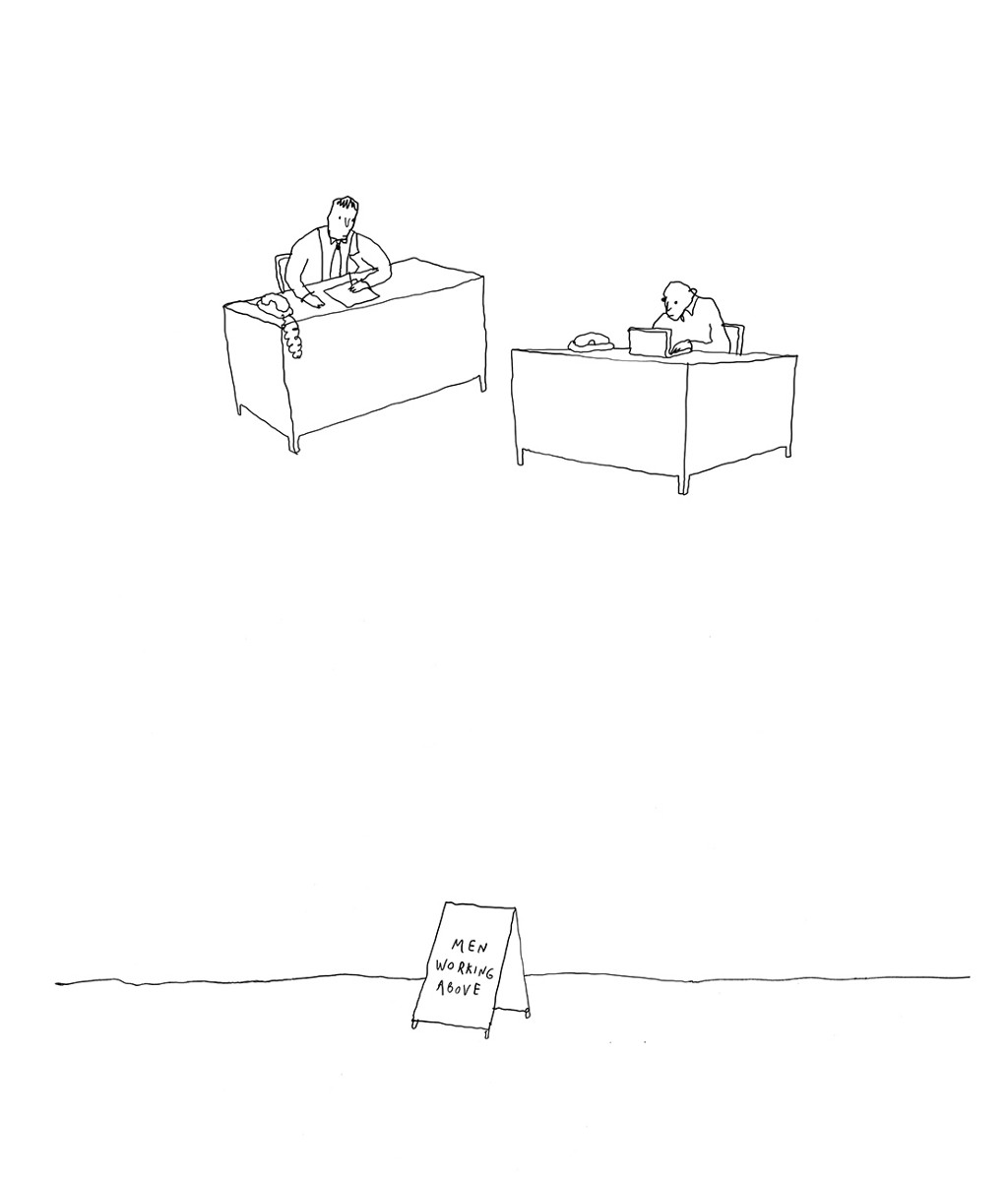Hayden Pedigo, "Good Night"
Good luck.

Has America ever needed a three-day weekend more than it does right now? It doesn’t matter, because we’re going to get one anyway but you know he’s just going to ruin it somehow. We’ll be back here Tuesday no better rested than we are this morning, when we can be best described as “fragile,” “anxious” or “on edge.” Too bad! This is how things are now. Try to pretend you don’t have to worry about whatever horrible shit is coming down the pike with your name on it for as long as you can over the next three days. It won’t make any difference but at least it will distract you for a while.
Here’s something pretty that will hopefully do the same. Enjoy. [Via]
New York City, May 24, 2017
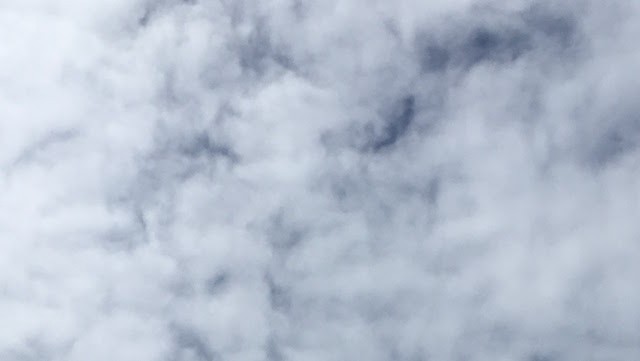
★★★ Mellow gray light and cool air attended on the long and unsteady rise from the sickbed. The west through the blinds became brighter and bluer, and the outdoors sounded inviting. The clouds were not thick enough to be gloomy, just enough to make the light diffuse and gentle. The coolness touched the scalp. It would have been possible to walk indefinitely if the shaky legs had been up to it. Descending, the sun behind the thin clouds was enlarged and blurry, like something from the matte-painted backdrop to a new world in a science-fiction movie.
Prepared For The Worst
The comforts of dark matter

Modern society, as a whole, tends toward a sort of institutional optimism, espousing Hegelian notions of history as progress and encouraging us to believe happiness is at least potentially available for all, if only we would pull together in a reasonable manner. Hence the kind of truth pessimists tell us will always be a subversive truth. All the quotations I chose from Cioran, almost at random, could be understood as rebuttals of the pieties we were brought up on: that knowledge is a vital acquisition, that we must work to help and save each other, that it is positive to be industrious and healthy, that freedom is supremely important, and so on.
Such a radical deconstruction may be alarming, yet when carried out with panache, zest, and sparkle, it nevertheless creates a moment’s exhilaration, and with it, crucially, a feeling of liberty.
Why do we read pessimistic writers? Some of us would immediately answer “for confirmation,” but Tim Parks has a couple of other ideas.
Barack in the Biergarten of Good and Evil
Deutschland über us.
Barack Obama, our ex-stepdad who we thought was going to adopt us and save us from our abusive mom (THE AMERICAN VOTER), has instead moved on with his life and is currently chilling in Berlin with longtime “companion” and apparent new girlfriend Angela Merkel, and boy are HER kids thrilled.

The ostensible purpose of his visit is to talk about humanitarian issues during bi-annual German Evangelical Church Assembly, a five-day congress of discussions, panels and other faith-based events attended by 100,000 lay members of the mainline German Protestant faiths (some 27 percent of Germans; a plurality of Germans is ohne Glaube, or “not religious”).
Given that his new girlfriend looooooves humanitarian issues — ooh la-di-da, I get it, she’s better than us, you just had to leave — and is also a very famous lay German Protestant, it’s unsurprising that our ex-stepdad would fly over to hang out, and possibly lend a hand with with her long-shot underdog campaign for re-election (ha ha ha ha ha ha ha).

But according to the German media — some of whom lead off coverage with open wishes that Obama were still US-Präsident — that’s a front. The former President is in Germany to Redeem us all. Check the headline from Der Spiegel, which proclaims that on this “Church Day” — the literal translation of Kirchentag (KURCH-un-TOG), or church assembly — Germany welcomes der frohe Botschafter.

This phrase (pronounced dare FRO-uh BOAT-shaft-ur) literally translates to “joyful ambassador,” which is of course what the former President technically is now, but it’s not actually what that phrase means to Germans — and, relatedly, why you should never use Google Translate to do your foreign-language homework, kids, because you will turn in a pile of gibberish-ass nonsense.
What der frohe Botschafter really means is the ‘bearer of Good News,’ with frohe Botschaft being the German translation of “the Gospel,” a.k.a. the Biblical Greek ευαγγελιον, which the Germans pronounce Evangelium, which is (aha!) where the name of their Protestant denominations comes from.
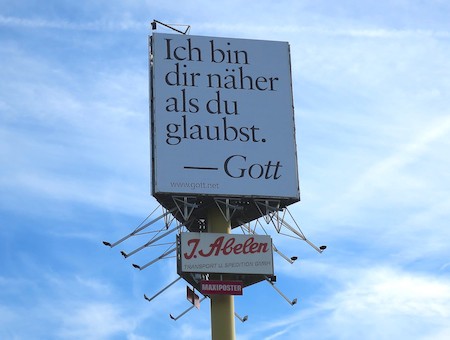
So, in conclusion, Der Spiegel is hella good at headlines that mine the multivalence of the German language, and Barack Obama is somehow still supposed to save us all from an eternal fiery hell-scape where candidates for elected office can beat journalists up on camera and it helps their chances to win.

Speaking of excellent conclusions to rigorous academic research, another gentleman who liked to style someone der frohe Botschafter sardonically was Nietzsche, who spat it so often in Der Antichrist it became an insult, and then later turned that insult sarcastically (but also sincerely) on himself. In the chapter of Ecce Homo called “Why I Write Such Good Books” (“Why I Am So Good At Semi-Sarcastic Referential Self-Epithets” was, presumably, altered during editing), Nietzsche refers to the conclusions of Twilight of the Idols as “the right way, the way upwards,” which nobody before him had, “to be honest,” been able to figure out.
“Only after my time was there hope again, great tasks, road-maps for the culture — I am their froher Botschafter.”
Jesus H. Christ, that Bearer of Good News sounds disconcertingly familiar. And I guess if I were our ex-stepdad, and I were given the choice to stay here and bear the fruit of the great “way upwards,” or go hang out with Cool Tante Merkel on a couch, I know what I’d do.

Especially right now. Because late May means one thing and one thing only in the Federal Republic: the Schmuddelwetter has lifted, the scarves are worn by ornament and not necessity; the trees stehen in voller Blüte; the sunscreen-free abuse of the tanning-bed has been traded for the sunscreen-free abuse of the real thing (on all body parts, natürlich) — in short, lo, I bring unto thee the Good News that Biergarten season is risen.

Every flat surface in the general vicinity of a purveyor of liquid (be that a pub, restaurant, private residence, or abandoned-looking hut in the middle of the woods) has, by now, had jauntily umbrella’d tables spring to life upon it, and at those tables gather the hordes, the very Pöbel Nietzsche deplored, gazing up at the sky and laughing their asses off (if they’ve been properly trained, that is), and throwing back Bier, the beverage the good Lord invented warm weather for.
That Germans would spend the majority of their eating-and-drinking hours (so, the majority of their hours) outside in nice weather is no surprise, given that these are a people who would live outside permanently if they could find a way to do it without ever getting cold or wet. One of the reasons that German health-care costs are so much lower than ours is that the number-one remedy for any ailment is to grab your dicky little hiking sticks and go on a walk.
This is a value that’s indoctrinated as young as possible, with the Waldkita (VALD-keet-ah), or outdoor preschool, and continues into hipster adulthood, when too much Biergarten enjoyment plus Instagram somehow makes it impossible to determine when something is clearly, obviously, a river.
Is This A Picture Of A River Or A Wall?
So what existentially traumatized ex-president wouldn’t want to go have a German beer under the stars? And who wouldn’t want to have one with him?
The second question actually points to a rather striking cultural similarity between our land, where we make most of our political decisions based on memes, and theirs, where political advertising is strictly limited to poster campaigns and logic.
And yet: According to this recent post by Friedemann Karig on the Cool Young Person’s Website JETZT, all German politicians absolutely must drink beer.

“The beer in a politician’s hand says: ‘I am one of you. And you are good.’ Beer is the drink of the worker, the simple and honest man. Particularly for suit-wearing bigshots, it’s a carbonated foot in the door to the domain of the ‘little man.’”
During the Bush years, old people such as myself had major shit-fits about how your desire to have a beer with someone had fuck-all to do with fitness to lead the vaguely-free world; then, we promptly elected the person we’d most like to have a beer with.
Eight years later, the other side overcompensated in the opposite direction: Our current US-Präsident’s attitude about whether he’d enjoy a beverage with his subjects is best summed up by this, another eerily prescient moment in Ecce Homo:
Ich kenne mein Los. Es wird sich einmal meinen Namen die Erinnerung an etwas Ungeheures anknüpfen — an eine Krisis, wie es keine auf Erden gab, an die tiefste Gewissens-Kollision, an eine Entscheidung heraufbeschworen gegen alles, was bis dahin geglaubt, gefordert, geheiligt worden war. Ich bin kein Mensch, ich bin Dynamit.
I know my fate. Someday, my name will trigger the memory of something formidable — a crisis unlike anything on Earth, the most profound collision of conscience, a decision made against everything that had heretofore been believed, demanded, hallowed. I am not man. I am dynamite.
I’ll take that beer now, please.
Grading (A)lternatives
For when a regular A just won’t do.
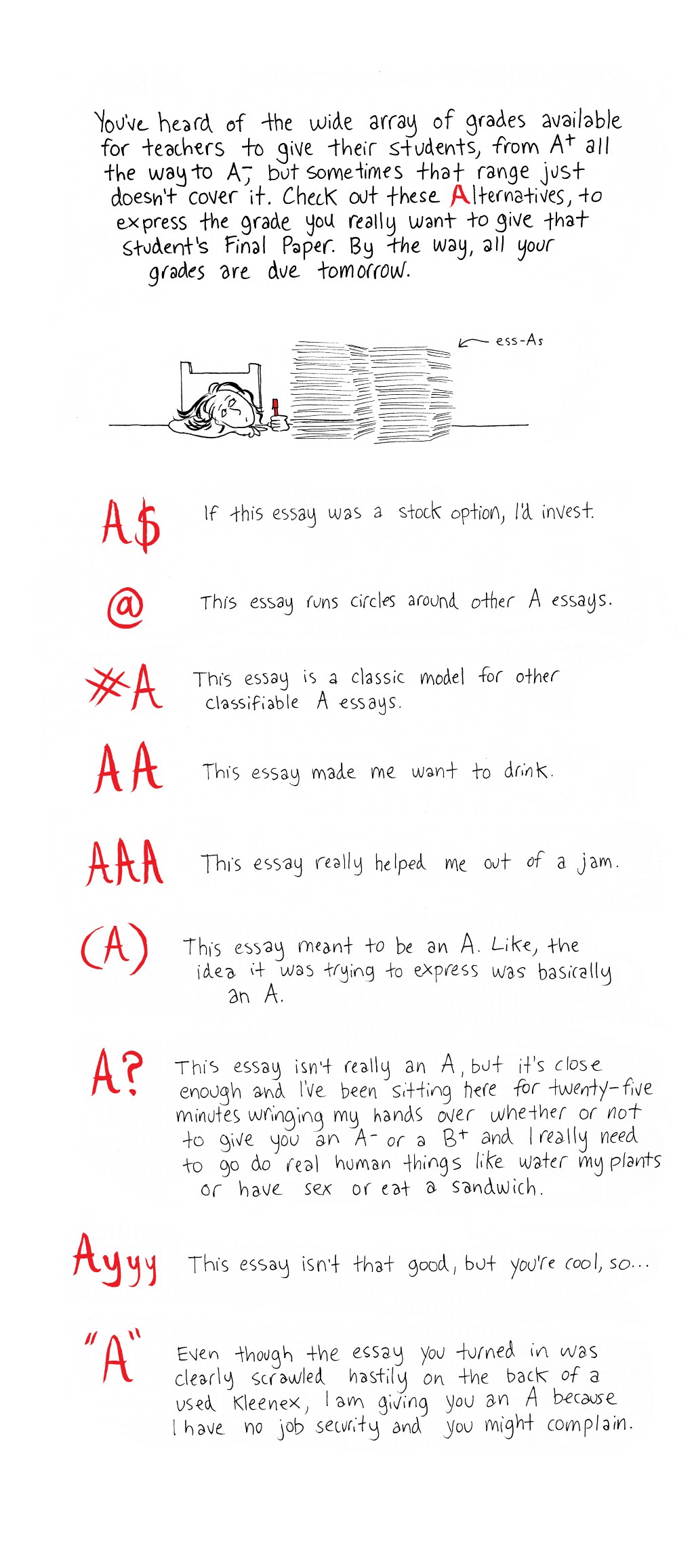
Amy Kurzweil’s cartoons appear in The New Yorker and elsewhere. She is the author of Flying Couch: A Graphic Memoir. All of her students are (A)mazing.
The Way We Cover Bad Tweets Now
In the New York Times Styles section, obviously.
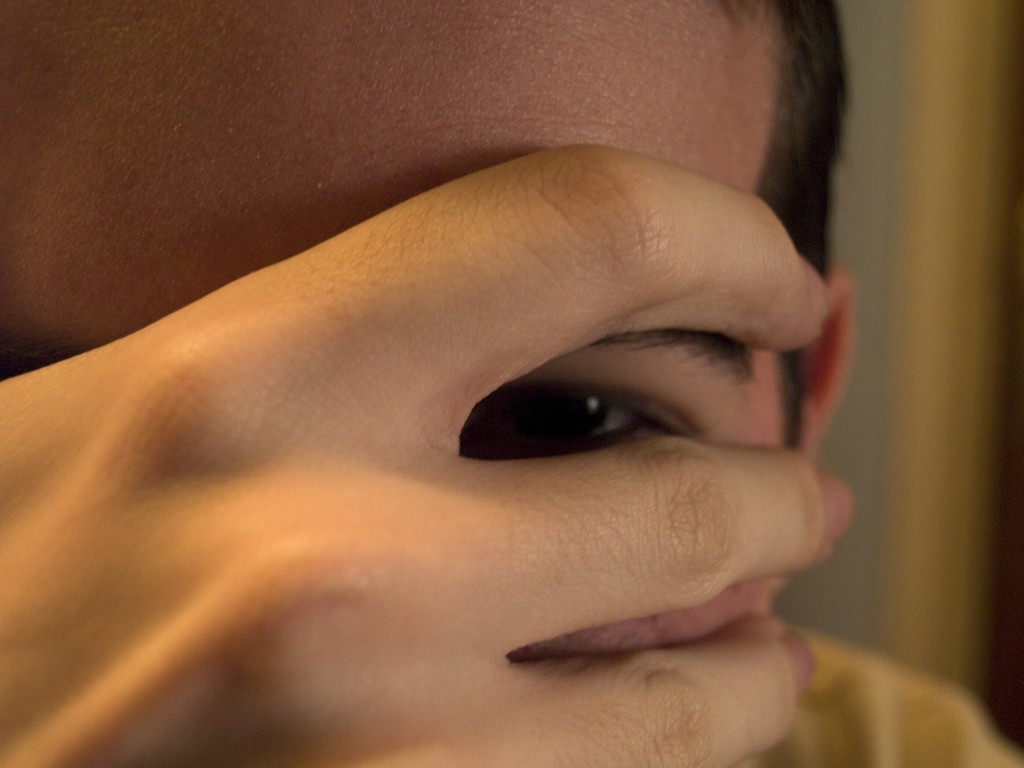
Amid the criticism, Mr. Leavitt has continued to tweet.
David Leavitt’s Tweets About Manchester Leave a Bad Taste
Nevertheless, he persisted!!!
I truly didn’t think I would learn anything by reading this article about the man who did the bad tweet, but I did! He’s a paid spokesbrander/brandfluencer, or as Katherine Rosman puts it, “a cog in the wheel of the gig economy.” Shivers.
A Poem by Tracy K. Smith
The Angels
Two slung themselves across chairs
Once in a motel room. Grizzled,
In leather biker gear. Emissaries
For something I needed to see.
I was worn down by an awful panic.
A wrenching in the gut, contortions.
They sat there at the table while I slept.
I could sense them, with a deck
Of playing cards between them.
To think of how they smelled, what
Comes to mind is rum and gasoline.
And when they spoke, though I couldn’t,
I dared not look, I glimpsed how one’s teeth
Were ground down almost to nubs.
Which makes me hope some might be
Straight up thugs, young, slim, raw,
Who bounce and roll with fearsome grace,
Whose very voices cause faint souls to quake.
— Quake, then, fools, and fall away!
— What God do you imagine we obey?
Think of the toil we must cost them,
One scaled perfectly to eternity.
And still, they come, telling us
Through the ages not to fear.
Just those two that once and never
Again for me since, though
There are — are they? —
Sightings, flashes, hints:
A proud tree in vivid sun, branches
Swaying in strong wind. Rain
Hurling itself at the roof. Boulders,
Mounds of earth mistaken for dead
Does, lions in crouch. A rust-stained pipe
Where a house once stood, which I
Take each time I pass it for an owl.
Bright whorl so dangerous and near.
My mother sat whispering with it
At the end of her life
While all the rooms of our house
Filled up with night.
Tracy K. Smith’s most recent book of poems is Life on Mars, which received the Pulitzer Prize. A new collection, Wade in the Water, is forthcoming in 2018. Her memoir, Ordinary Light, was shortlisted for a National Book Award. She teaches at Princeton University.
The Poetry Section is edited by Mark Bibbins.
Penguin Cafe & Cornelius, "Solaris" (Cornelius Mix)
What’s it like to still have hope?

If you woke up this morning thinking things would be better I want you to find someone close, someone you trust, who will sit you down and explain to you that things are only going to stay bad or get worse from now on. “Yes, but there’s a three-day weekend coming up,” you’ll say. “Hey,” your friend will respond, “you’re the one who asked me to sit you down and have this talk with you in the first place, this is why no one has bothered with it before, you just don’t listen even when we’re trying to do something for your own good, I’m fucking sick of it,” and then he or she will storm off, leaving you wondering why so many of your conversations end this way. But because you are the kind of person who can still wake up in the morning, in spite of all evidence to the contrary, thinking things will be better it won’t take you long before you laugh the whole thing off and go on about your day in a spirit of optimism and not a little confusion. I have to say, I’m jealous. I wish everything could float by me that way. It must be nice. No wonder you’re always smiling.
Speaking of nice, here’s a collaboration between Penguin Cafe and Cornelius. Enjoy.
Courtney Barnett, "How to Boil an Egg"
“Every morning I feel more useless than before”
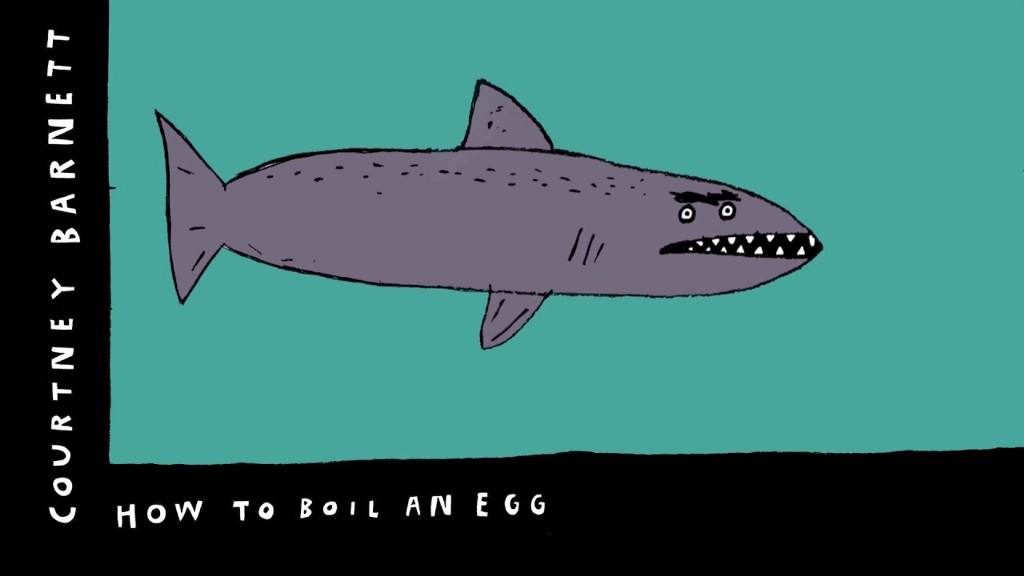
Is anyone better at songs with food titles than the witty, rambly Auswtroaeleeiyan Courtney Barnett? I submit the humble thesis: no. Last year she released “Three Packs a Day” (about ramen) and in 2013 she had “Pickles from the Jar” (about opposites). To say nothing of a double EP titled “A Sea of Split Peas,” with a special shoutout to “Canned Tomatoes (Whole).” Here is a good song that I have been listening to on repeat for at least eight hundred years, since it was released last Monday (eight hundred years ago). Rolling Stone calls it “a jangly new deadpan rocker.” Yes; enjoy.

